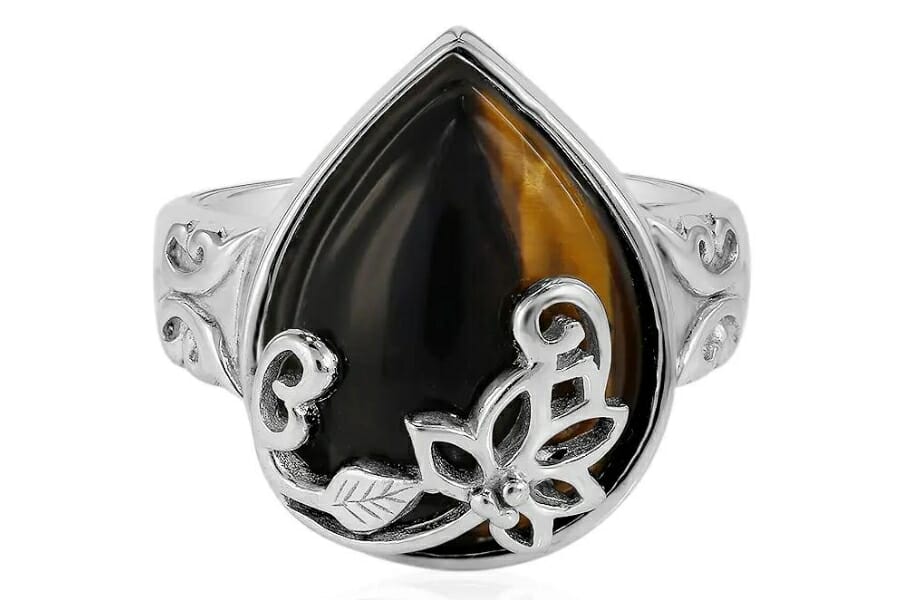Tiger’s Eye is a stone that makes you look at it twice. It’s a beautiful metamorphic rock with bands of golden, brown, and sometimes even red colors that shine in a unique, silky way. What is the most remarkable thing about it?
Each stone looks almost like it has its fingerprint, which makes it a favorite among collectors and fashionistas. Tiger’s Eye has beauty and value, making it hard to ignore. It’s one crystal that is worth looking at!
Whether you want to dazzle at a social event or meditate on your inner strength, this stone says, “Why not do both?”
What Tiger’s Eye Is
Tiger’s Eye—the gemstone that seems like it’s winking at you from across the room! Comprising bands of golden, brown, and sometimes even hints of red or blue, this metamorphic rock is a feast for the eyes.
When you see it catch the light just so, creating that signature “cat-eye” effect known as chatoyancy, you’re instantly drawn in. It’s the drama queen of the gem world, demanding your attention whether it’s showcased in a ring, a pendant, or a necklace.
When you get down to it, Tiger’s Eye is a multitasker. It’s fashion-forward but rooted in tradition; it’s visually captivating but energetically grounding. That rare mix of flash and substance makes it an all-rounder in the gemstone league.
We’ve compiled a list of the most common tiger’s eye colors and how much they usually cost. It’s important to remember that these aren’t the only colors but the most common ones.
Black Tiger’s Eye
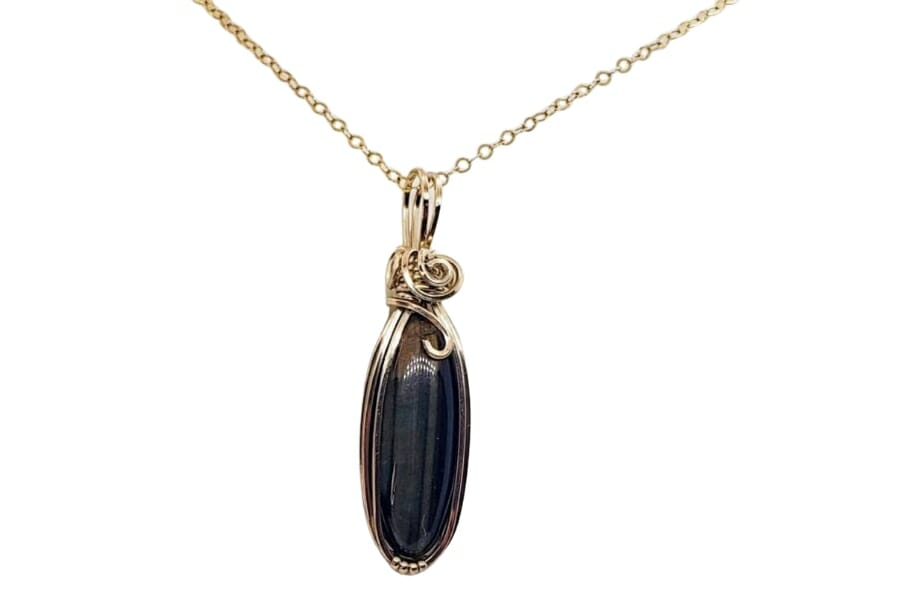
Black Tiger’s Eye, also called Hawk’s Eye, takes the beautiful qualities of regular Tiger’s Eye and adds a layer of mystery and charm to them. This gemstone has deep colors that look almost like midnight.
Instead of golden and brown bands, it has dark blues and blacks but still has the famous chatoyant effect. When the light hits it just right, the stone looks like it’s alive, and its shiny “eye” looks like it’s looking into your soul.
How much is a black tiger’s eye worth
Black Tiger’s Eye (or Hawk’s Eye) can have a wide range of prices, depending on size, quality, and skill, if made into something like jewelry. It can go between $1 to $3 per carat.
Blue Tiger’s Eye
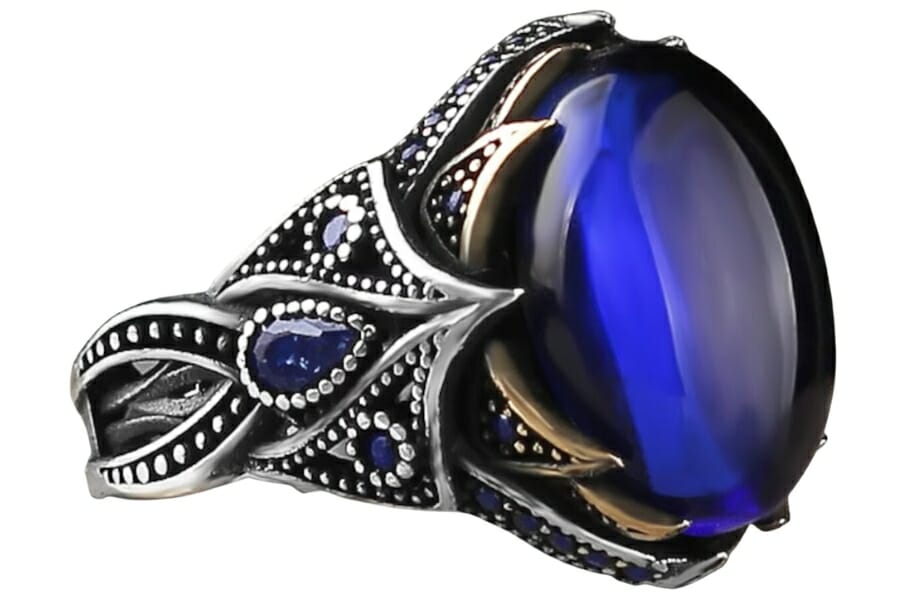
Blue Tiger’s Eye is like the cool, calm cousin of the lively Tiger’s Eye family. Instead of the warm golds and browns you might be used to, this gemstone draws you in with bands of rich, silky blues and dark grays.
Its shiny chatoyancy still draws people in, but the effect is more like moonlight on water: calm and a little bit otherworldly. If classic Tiger’s Eye is the fire, then Blue Tiger’s Eye is the water—cool, soothing, and just as enjoyable.
How much is a blue tiger’s eye worth
Prices for blue tiger’s eye stones could range from $0.10 to $3 per carat. It tends to be relatively affordable compared to the other colors and types.
Gold Tiger’s Eye
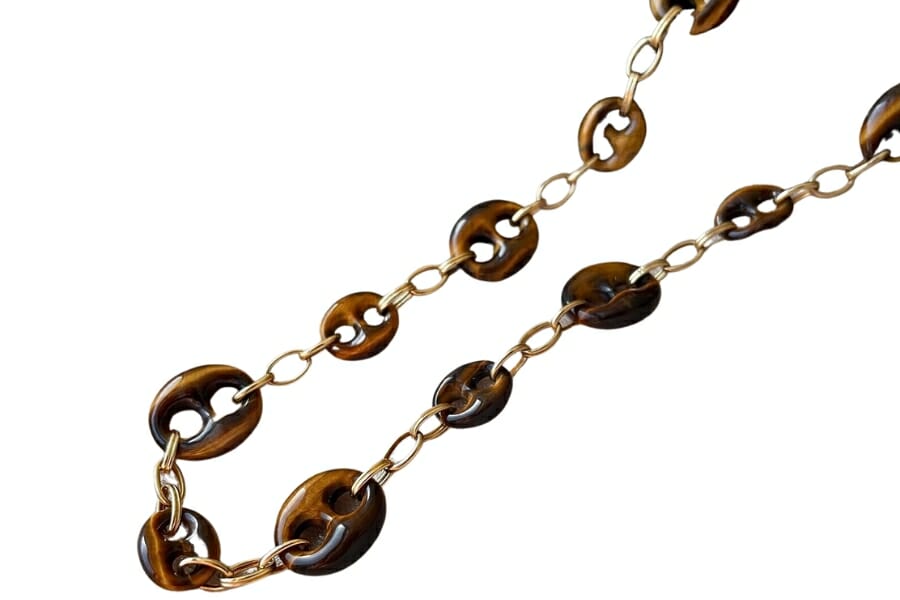
Gold Tiger’s Eye is the classic gem that most people think of when they hear “Tiger’s Eye.” This stone defines earthy elegance with its bright bands of golden yellow, rich brown, and even a touch of amber.
Its signature chatoyancy, a captivating cat-eye effect, comes to life when the stone moves in the light. This makes it a scene-stealer in any form, whether it’s a dazzling ring, a statement necklace, or even a simple worry stone.
How much is gold tiger’s eye worth
The price per carat can range from $2 to $100 for better-quality stones. Stones with clear, strong chatoyancy (the “cat-eye” effect) and bright, well-defined bands of color usually sell for more.
Green Tiger’s Eye
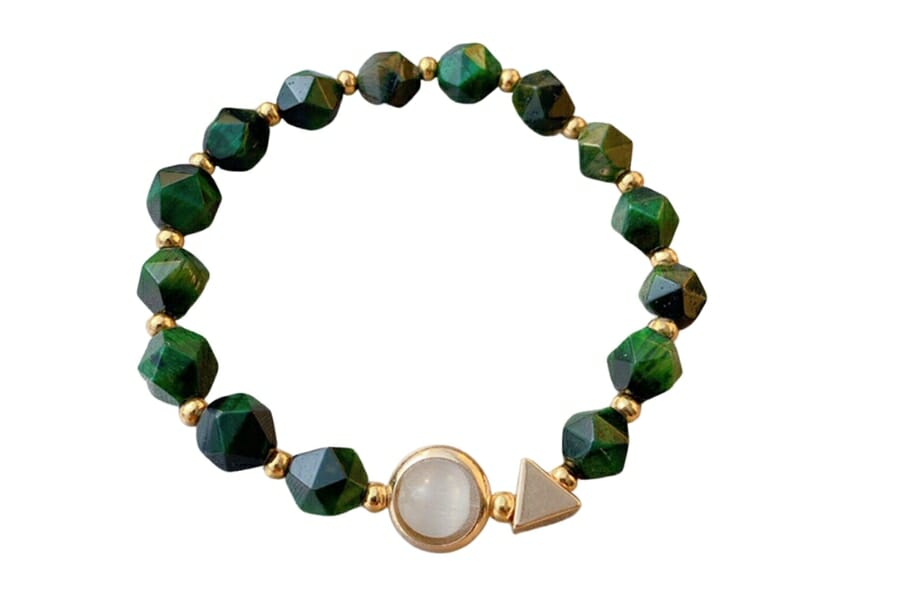
Green Tiger’s Eye is like the sage of the Tiger’s Eye family—mysterious, it helps you feel grounded and has a little bit of a secret. This one-of-a-kind version mixes bright greens and darker, more shadowy colors, making the stone look almost like a forest.
Green Tiger’s Eye is a beautiful reminder of how beauty and meaning are connected in the natural world. This stone is an excellent example of whether you like its green colors for how they look or how they make you feel.
How much is a green tiger’s eye worth
Stones with vivid green color, well-defined chatoyancy, and minimal imperfections usually range between $1 to $3 per carat.
Multi-colored Tiger’s Eye
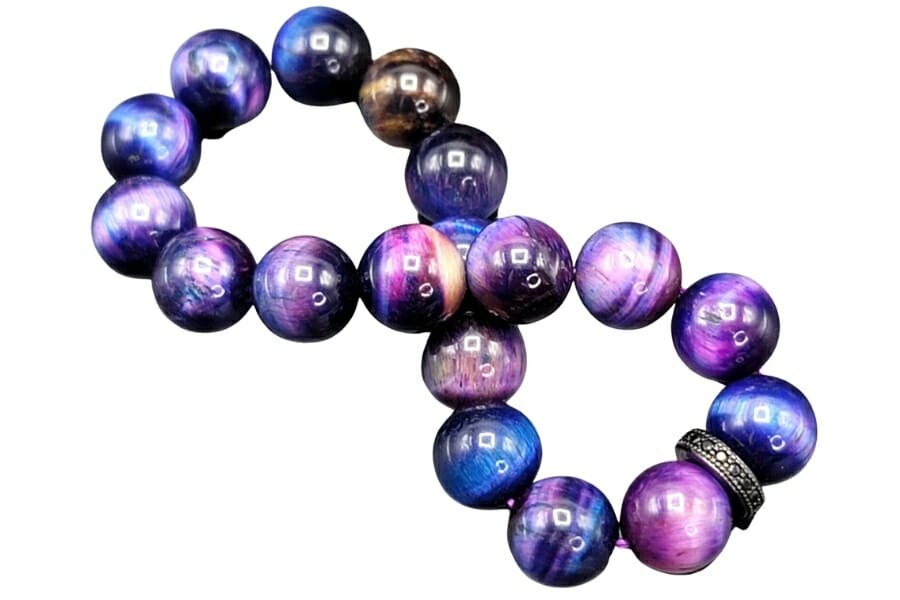
Tiger’s Eye, with its many colors, is like the party guest that everyone talks about. It’s bright, mesmerizing, and hard to ignore. This beautiful version has a kaleidoscope of colors, from the classic golden browns to blues, reds, and greens, all in one beautiful gemstone.
The charming “cat-eye” effect is still the show’s star here. It makes the light dance across the different colors, making them look like a tapestry of colors created by nature. Simply put, multicolored Tiger’s Eye is a sight to behold and a source of inspiration.
How much is a multi-colored tiger’s eye worth
The multi-colored tiger’s eye could command a price range between $1 to $1.5 per carat if the colors are vivid and well-balanced.
Why Tiger’s Eye Is So Expensive
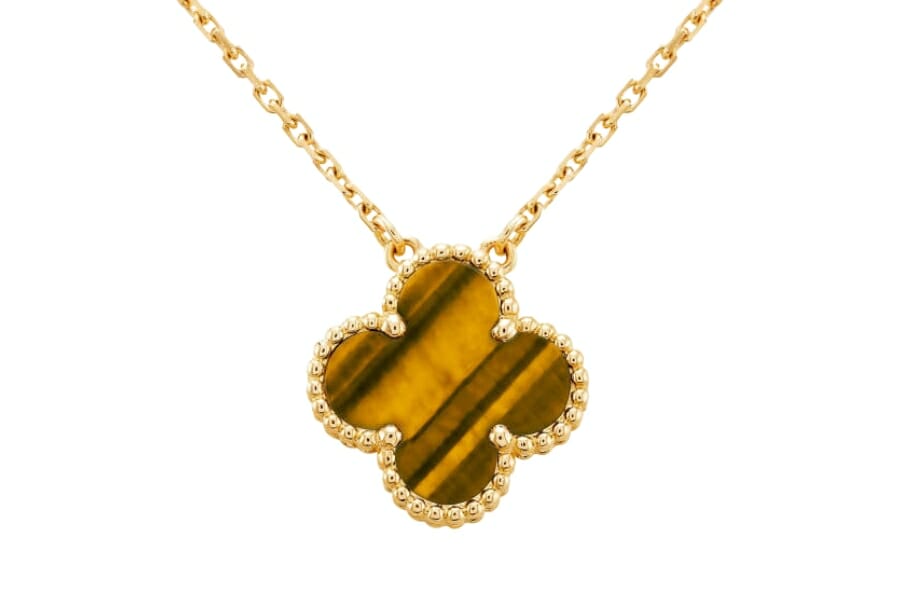
Tiger’s Eye has a lasting appeal beyond just how it looks, even though that is a big part. When you first see this gemstone, its chatoyancy—the hypnotic “cat-eye” effect that makes the stone seem to come to life—immediately grabs your attention.
The way light moves over the gem’s surface is like nature’s own optical illusion, and it’s a big reason why people love and admire it. Tiger’s Eye is a beautiful stone, but it also has a lot of history and meaning behind it.
Since the Middle Ages, it has been seen as a symbol of courage and safety. In different cultures, it was thought to bring good luck, protect against the evil eye, and even help people understand difficult situations.
Tiger’s Eye is durable and can be used in many different ways. It’s an easy-to-get luxury that’s both elegant and inexpensive, making it popular for all kinds of jewelry.
It also comes in different colors, like gold, blue, red, and even multicolored. Each color has its spiritual properties and uses. Tiger’s Eye is more than just a rock because of how it looks, what it means historically, and how it can be used in many different ways.
This makes it a treasured gemstone that is valued across time and cultures. Whether you’re interested in spirituality or history, the fact that this stone has a long and interesting history gives it even more value.
How To Determine The Value Of Tiger’s Eye
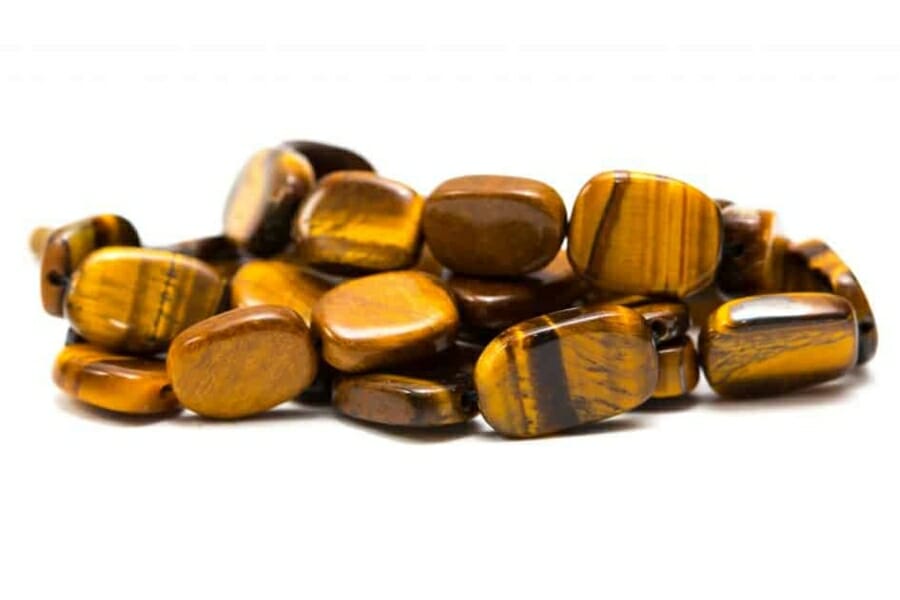
The prize of a piece of tiger’s eye on the market is based on several important factors. Here are just a few of the most important ones:
Color
The intensity and vibrancy of a Tiger’s Eye’s color can significantly influence its price. Rich, deep hues are generally more valued over pale or washed-out colors. Multi-colored Tiger’s Eyes can also command a higher price if the colors are vivid and well-balanced.
Chatoyancy
One of the defining characteristics of Tiger’s Eye is its chatoyancy, or the “cat-eye” effect. Stones with a strong, well-defined chatoyant band are generally more prized than those with a weak or diffuse effect.
Clarity and Quality
Tiger’s Eye is usually quite clean and free of inclusions, but any cracks, chips, or other imperfections can lower its value. The overall quality of the stone—its cut, polish, and general appearance—also plays a role in determining its price.
Size
Larger pieces are generally more expensive on a per-carat basis, particularly if they also excel in other quality factors like color and clarity. However, smaller stones with exceptional qualities can still command a high price.
Craftmanship
If the Tiger’s Eye is part of a piece of jewelry, the quality of the design and craftsmanship, as well as the materials used (e.g., gold, silver, other gemstones), can significantly influence its price.
Provenance
The origin of the stone can also affect its value. While Tiger’s Eye is found in several parts of the world, stones from certain locations may be considered more valuable due to their quality or rarity.
Market Demand
Like any other commodity, the price of Tiger’s Eye is influenced by supply and demand. If a particular color or form of Tiger’s Eye becomes fashionable or sought-after, its price can rise accordingly.
Certification
A certified stone, authenticated by a reputable gemological laboratory, may command a higher price as it assures the buyer of the gem’s quality and authenticity.
Retailer reputation
Finally, where you’re buying the Tiger’s Eye from can also impact its cost. Reputable dealers who offer quality stones, possibly with certification, may charge more than less-known or online vendors.
Tiger’s Eye Price By Color
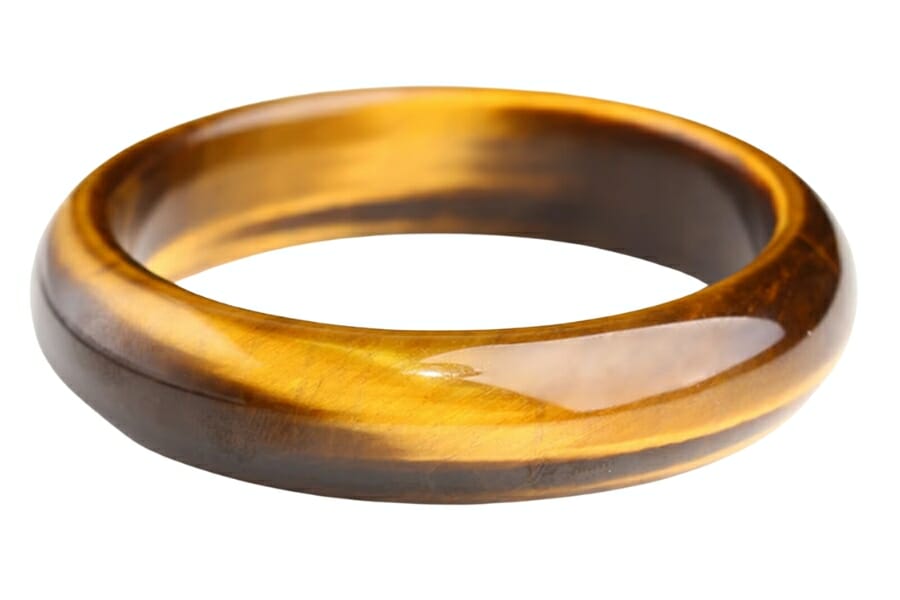
To know how much a tiger’s eye is worth and its value, you need to know as much as you can about it.
Here are the most common colors of tiger’s eye and how much they cost.
Tiger’s Eye values by color
| Color | Location | Price (Per Carat) |
| Black tiger’s eye | Any | $1 to $3 |
| Blue tiger’s eye | Any | $0.10 to $3 |
| Gold tiger’s eye | Any | $2 to $100 |
| Green tiger’s eye | Any | $1 to $3 |
| Multi-colored tiger’s eye | Any | $1 to $1.5 |
Different colors of tiger’s eye are worth different amounts and cost. Let’s look at how much tiger’s eye cost in other units.
Tiger’s eye pricing by unit of measurement
| Measurement | Price |
| A carat of tiger’s eye | $0.10 to $100 |
| A gram of tiger’s eye | $$0.50 to $500 |
| An ounce of tiger’s eye | $14 to $14,175 |
| A kilogram of tiger’s eye | $500 to $500,000 |
| A pound of tiger’s eye | $230 to $226,800 |
| A ton of tiger’s eye | $453,600 to $453,592,500 |
How To Get An Appraisal On Your Tiger’s Eye
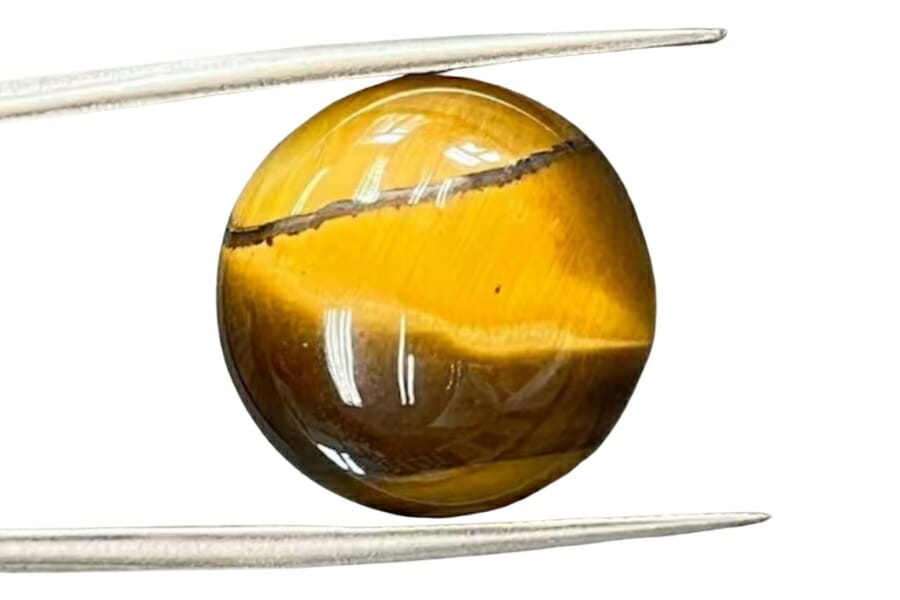
Getting your Tiger’s Eye appraised can tell you important things about its quality, authenticity, and value on the market. Here’s a step-by-step list of what to do:
Look for a certified appraiser who knows a lot about gemstones or jewelry. Check their credentials and ensure they are accredited by reputable organizations like the Gemological Institute of America (GIA), the American Gem Society (AGS), or other well-known gemological associations.
Once you’ve chosen an appraiser, you should set up a time for the evaluation. Most of the time, it’s best to have the appraisal done in person so the appraiser can look at the stone closely.
Bring along any paperwork about your Tiger’s Eye, such as purchase receipts or previous appraisals. This can give important background information for the current evaluation.
Usually, the gemologist will look at the stone and use tools to test it. They’ll look at the stone’s color, clarity, size, and chatoyancy to determine its quality.
At the end of the process, you should get a written document that tells you how the process went. This should include a detailed description of your Tiger’s Eye, the method used to value it, and an estimate of its worth on the market. Some appraisers also include pictures of the thing being valued.

